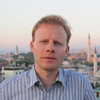Germans and Turks: Diamond Wedding
In 1961, (West) Germany and Turkey signed a recruitment agreement setting out the conditions under which Turks were allowed to work in Germany. Although long-term residence was initially forbidden, Germany became the permanent home of almost 3 million people from Turkey. There could be much to be celebrated, but because of the difficulties within bilateral relations, most people don't feel much like celebrating.
On May 27, 2021, a protestant priest, a rabbi, and an imam stood on a construction site in Berlin’s central Mitte district. There, the project ‘House of One’ is to be built in the next two years. The purpose of the house is to unite the three religions. There will be three sacred rooms placed around a fourth room that can be used by all. The building is to be built on the site of the former St. Peter’s Church, which was destroyed in 1945 and demolished in 1964. Of the 47 million euros the building will cost, the German government will pay 20 million and the state of Berlin 10 million. The Turkish Consulate General in Berlin issued a press release on the matter: “The project does not serve to bring the three religions together, but ONLY to separate them and to legitimize and support a terrorist organization.”
By terrorist organization, the Turkish Consulate means the ‘Forum Dialog,’ which represents Islam in this project and belongs to the Gülen sect. This is not the first and only criticism of the Forum Dialog's involvement in the project. In 2019, the project's promoter, Mrs. Dussmann dropped out, saying that only a small part of Islam was being represented. In the meantime, those responsible have reacted. They appointed two Muslims from completely different contexts of Islam to the board of trustees of the house. However, the largest association of Muslims in Germany, DİTİB (Turkish-Islamic Union for Religious Affairs), is not on the board.
While DİTİB was not involved in this Berlin project, it is involved in Germany’s biggest state of North-Rhine Westphalia as a member of a new commission, on which six Islamic associations will have a say in the expansion and future design of Islamic religious instruction at schools in the state. Previously, the state had put cooperation with Ditib on hold because of its proximity to Ankara, including in the school sector. The best-known German-Turkish politician, Cem Özdemir from the Greens, commented on DİTİB’s involvement, saying, “The state government of North Rhine-Westphalia and the CDU there have ensured that Erdogan has access to German schools. That is unbelievable.”
Turkey’s internal conflicts are playing out across Germany. Turkish state involvement in German daily life and politics is viewed increasingly critically by Germans, Kurds, Alevis, and liberal Muslims.
Bilateral relations also have their share of conflict. The fiercest clashes occurred in 2017 before the constitutional referendum in Turkey, when German politicians were accused of using ‘Nazi methods’ when Turkish politicians were banned from holding campaign events in the country. Last year, Germany became the mediator between Turkey and Greece. Still, it is impossible to call relations good or trustworthy. It is mostly about damage control and transactional relations at this point, as with the issues of migration and German tourism to Turkey.
There would be something to celebrate within bilateral relations this year: 60 years of the recruitment agreement. If Germany and Turkey were people, it would be their diamond wedding anniversary. This agreement in 1961 has changed both countries permanently, particularly Germany, which has transformed from a largely homogeneous country, via agreements with other countries, into a multicultural, pluralistic country. The journal zenith called it the ‘Deal of the Century’ and dedicated its spring 2021 issue to this topic. Many human interest stories of the first generation, which came in the early 1960s, usually by train from Istanbul to Munich.
Ali Başar explained how they arrived at the train station in November 1961 and was greeted by megaphone saying ‘welcome’ and was given fruit, cheese, bread, and sausages in a room with a hundred other younger men. “Of course, we thought it was pork and didn't want to eat it. The Germans looked at us and made 'Muhhhh.' We understood and ate the sausages.”
The 60 years of Turks in Germany has been a bumpy road. Neither Turks nor Germans thought at the beginning that the Turks would stay. The Germans saw the Turks as guest workers, the Turks wanted to stay at most a few years to save money for a business or house in Turkey. That is why Germany, for the first 40 years of Turkish presence, had no immigration policy and why many Turks didn’t see the need to integrate.
This has changed, of course. In two weeks, two German Turks will play for Germany at the European Championship, most likely in the starting 11. In September, the biggest number ever of German-Turks (many of them Kurds) will be elected to the German Bundestag, this time also again for the CDU. When the theatres and music festivals open again, many Turks will perform on German stages. On public television, the main news and the weather forecast are presented also by German-Turks. There is much to be celebrated at the occasion of this diamond wedding, but the general political atmosphere is one of mistrust and accusations. Thus, hardly anyone feels like celebrating.
The zenith issue also had some statistics. Even if those with a Turkish background are the biggest non-German population with 2.8 million, there are not really ‘Turkish’ neighborhoods in Germany. The Turkish presence is less urban and more rural than is usually portrayed. Often Berlin’s Kreuzberg district is seen as synonymous of Turks in Germany, but it has ‘only’ has 16 percent Turks. The frontrunner is Hamburg-Wilhelmsburg with almost 21 percent. Clear-cut still is the West-East divide. The Eastern Berlin district Marzahn has 0.54 percent Turks and the city with most Turks in Eastern Germany, Leipzig, not even 0.5 percent.

